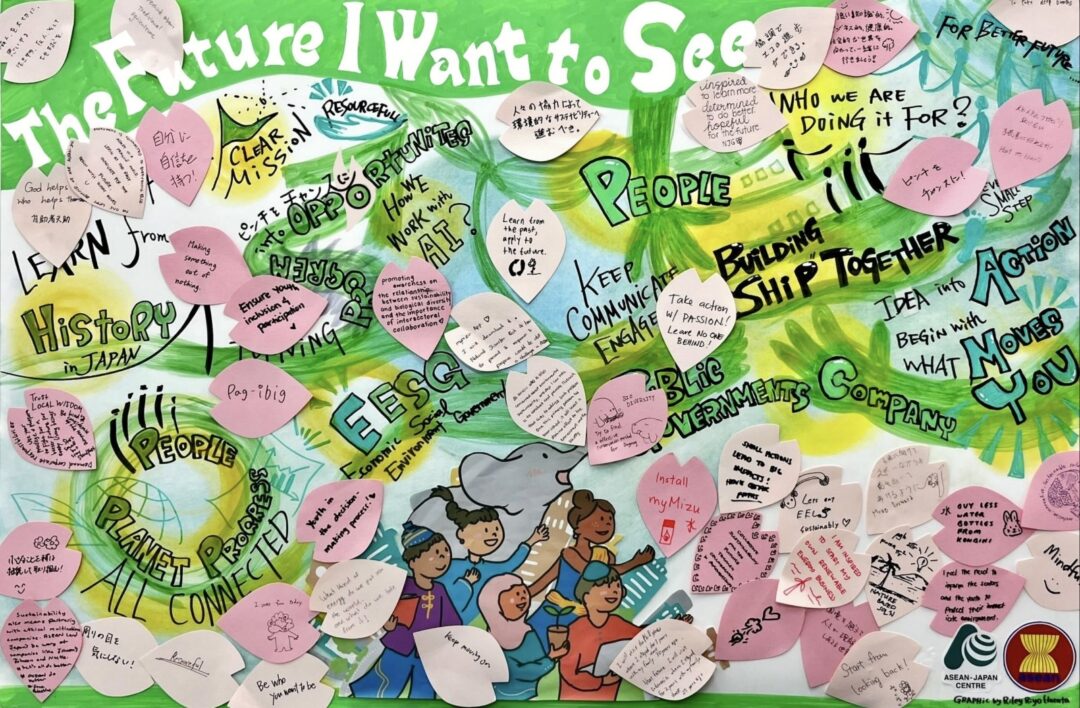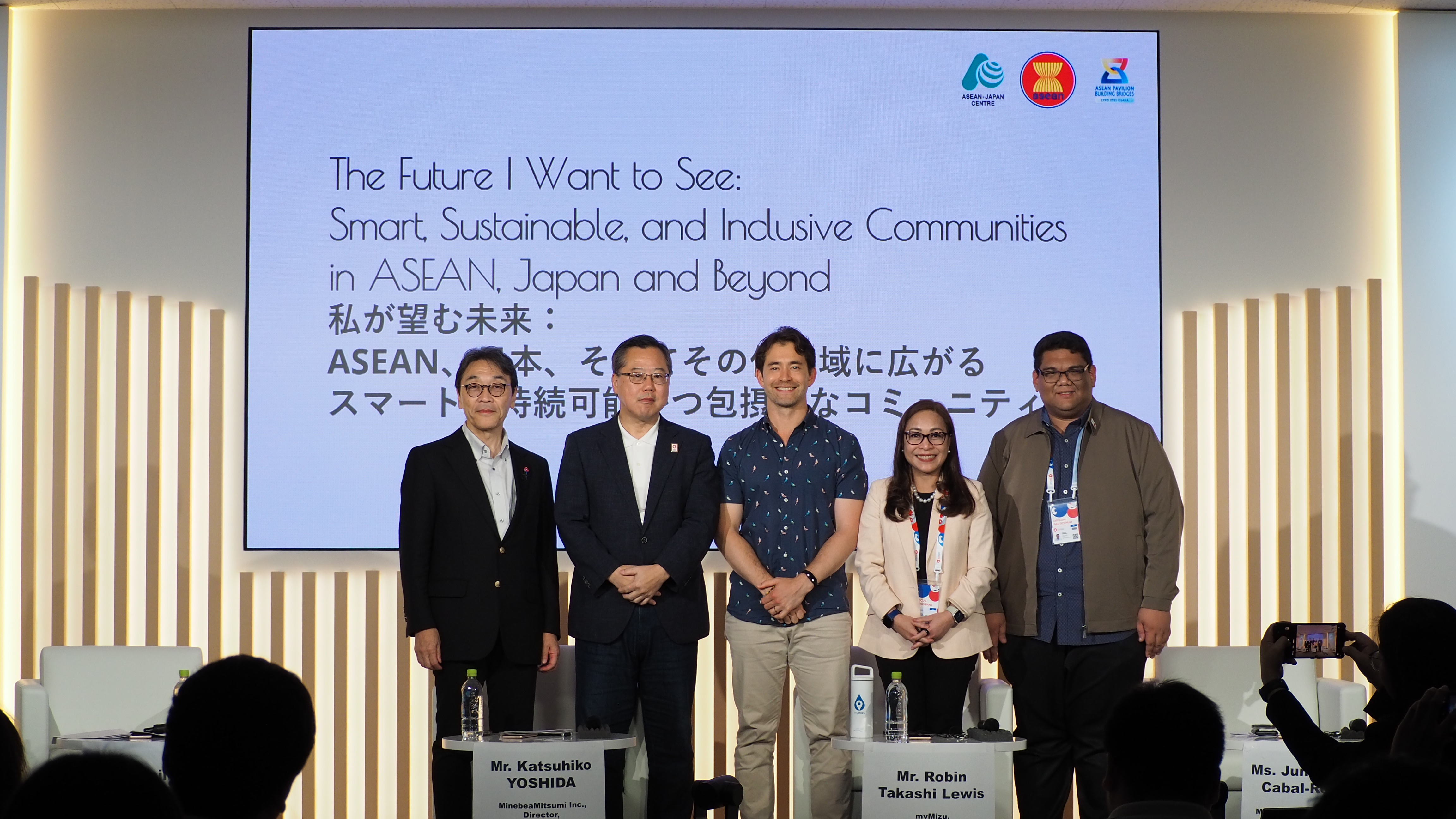The special dialogue and discussion, titled “The Future I Want to See: Smart, Sustainable, and Inclusive Communities in ASEAN, Japan and Beyond,” was held on May 25, 2025, at the Theme Weeks Studio, Yumeshima Island, Osaka, Japan, as part of the Osaka Expo 2025’s “The Future of Mobility and Community Week.” Organized by the ASEAN Secretariat and the ASEAN-Japan Centre, the program aimed to envision and showcase the future of communities by integrating smart technology, sustainability, and inclusivity as core values.
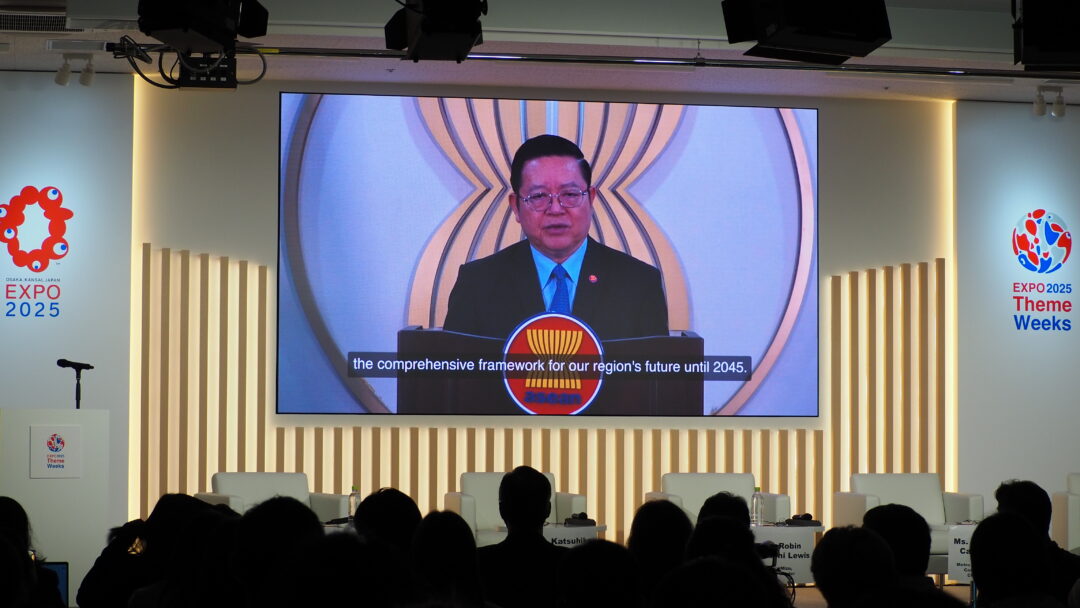
ASEAN Secretary General H.E. Dr. Kao Kim Hourn formally opened the event with a pre-recorded video, emphasizing ASEAN’s efforts to promote innovation and sustainability through existing regional platforms such as ASEAN Sustainable Urbanization Strategy, ASEAN Smart Cities Network, and the ASEAN Framework for Circular Economy. These initiatives fully align with the region’s new ASEAN Community Vision 2045.
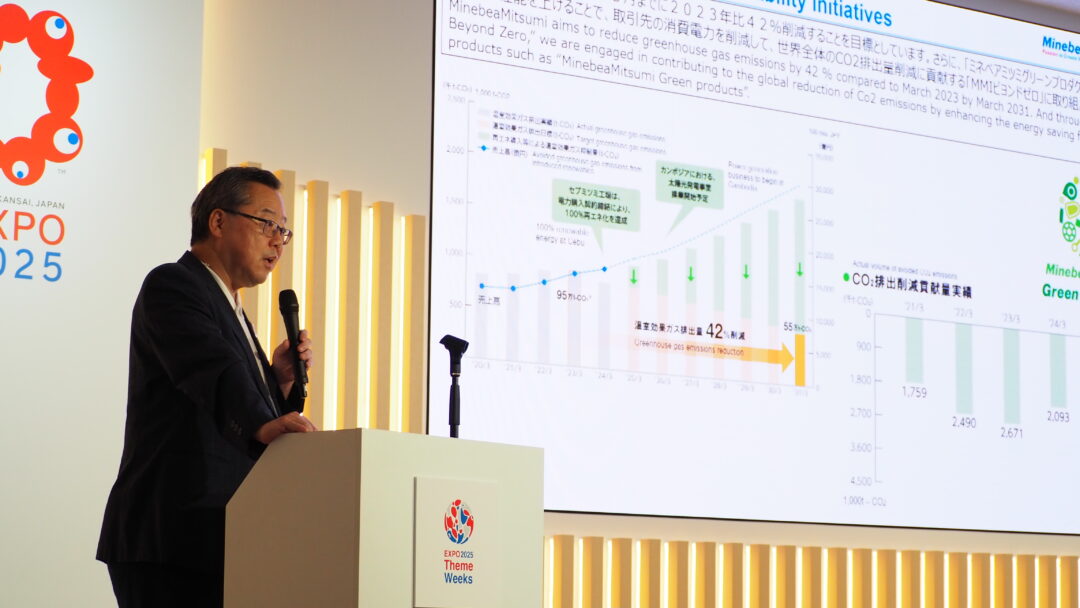
Mr. Katsuhiko Yoshida, Director and Chief Sustainability Officer of MinebeaMitsumi Inc., a leading Japanese manufacturer of semiconductors with active presence in ASEAN countries delivered the Keynote Speech. His speech drew from MinebeaMitsumi’s experience on how precision engineering and innovation can drive sustainable and inclusive development, highlighting efforts in energy efficiency and solar power initiatives in Cambodia and Thailand.
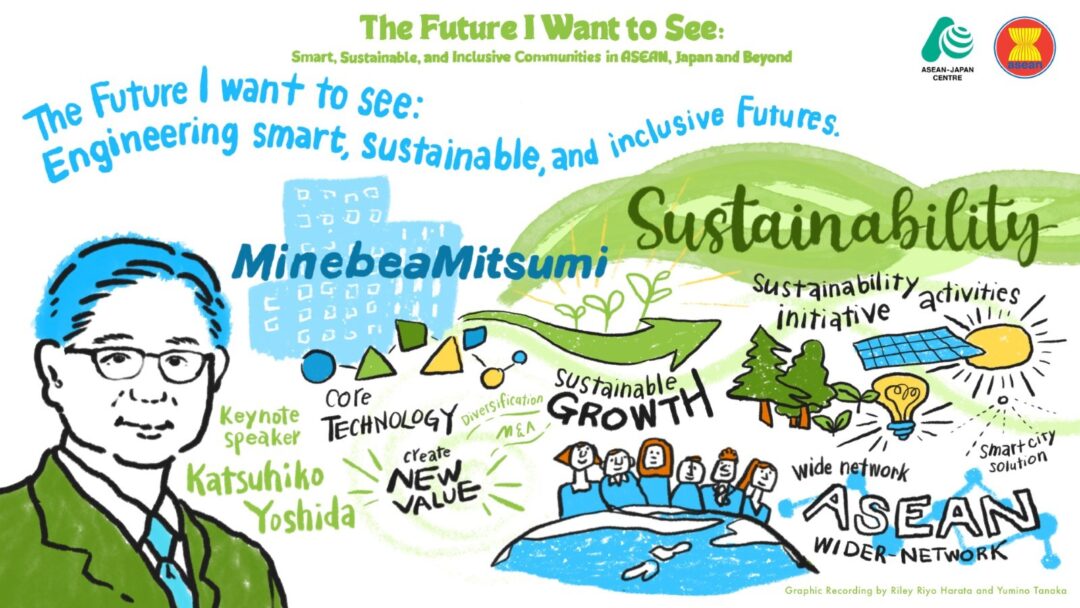
The succeeding panel discussion on innovation and sustainability featured Mr. Yoshida from MinebeaMitsumi Inc., Mr. Robin Takashi Lewis, CEO and Co-founder of myMizu, a transformative social enterprise in Japan, Ms. Chaye Cabal-Revilla, Chief Finance Officer, Chief Sustainability Officer and Chief Risk Officer of Metro Pacific Investments Corporation, a major investment company in the Philippines, and Mr. Jerome Barradas, Director of Public Engagement Division, ASEAN Centre for Biodiversity (ACB).
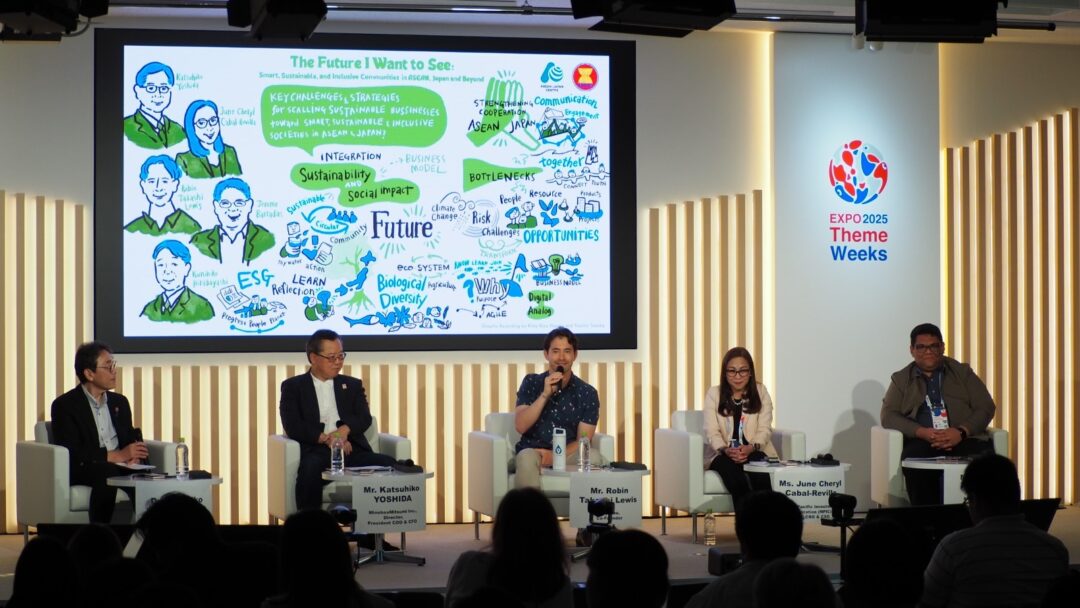
The discussion directly delved into the visions and strategies in engineering and designing an inclusive and sustainable future by embedding smart technology, sustainability, and inclusivity. Important key insights were gleaned from the discussion including the following:
- Scaling sustainable efforts: ACB’s Barradas emphasized that fostering collaboration and cross-sector partnerships among governments, businesses, and local communities is essential for scaling sustainability initiatives.
- Sustainability as a Catalyst: Sustainability is seen not just as a choice but as a foundation and a driver for socio-economic growth and resilience. Businesses are actively integrating sustainability into their core operations.
- Role of Technology: Cutting-edge technologies and smart innovations contribute significantly to transforming urban and rural areas into thriving, inclusive spaces, as seen from the experience of MinebeaMitsumi’s semiconductor production. AI and digital technologies play a role in advancing sustainability, though challenges exist regarding the digitalization of core analog know-how in precision manufacturing.
- Addressing Challenges and Seizing Opportunities: MPIC’s Cabal-Revilla highlighted that challenges like climate change, digital divides, and inequality require focus on human welfare and resilience. Physical and climate risk is a major challenge for infrastructure projects, particularly in disaster-prone areas like the Philippines, but also presents opportunities for mitigation and adaptation. Aligning business interests with environmental protection, especially biodiversity conservation, is a challenge being addressed through initiatives like the ASEAN Business and Biodiversity Initiative, where the ACB and MPIC are partnering to boost biodiversity conservation in the ASEAN region.
- Nature-Based Solutions: Promising solutions that achieve both ecological and economic sustainability include ecosystem restoration (like planting native trees), sustainable agriculture, circular economy, sustainable cities, and green infrastructure. Mainstreaming biodiversity by integrating it into key sectors like business, agriculture, and health is crucial.
- Youth Engagement: The aspirations and creativity of the youth are vital for shaping tomorrow’s solutions. Platforms like AJC’s Short Film Award spark imagination, and youth are actively involved in initiatives related to biodiversity conservation and sustainability.
- Entrepreneurial Mindset: For social enterprises such as myMizu, being resourceful with limited resources and having the ability to pivot quickly and be agile are key to growth and scaling sustainability solutions. Failures are seen as opportunities to learn and adapt.
- Inclusivity and Diversity: The principle of leaving no one behind is essential for the future. Including diverse stakeholders, such as indigenous peoples, local communities, women, and youth, is fundamental to frameworks like the Kunming-Montreal Global Biodiversity Framework and the ASEAN Biodiversity Plan. Multicultural settings are seen as assets, bringing different perspectives and strengthening teams.
- ASEAN-Japan Cooperation: The long-standing relationship between ASEAN and Japan is being enhanced through a Comprehensive Strategic Partnership, expanding cooperation into areas like sustainable development, digital transformation, biodiversity protection, and green infrastructure. There is significant potential for further exchange and co-creation towards a smart, sustainable, and inclusive future.
- Individual Action: Ultimately, realizing the desired future starts with people who care deeply and are ready to turn ideas into action. Attendees were encouraged to identify a step they feel called to take and begin there, building teams and learning from experience.
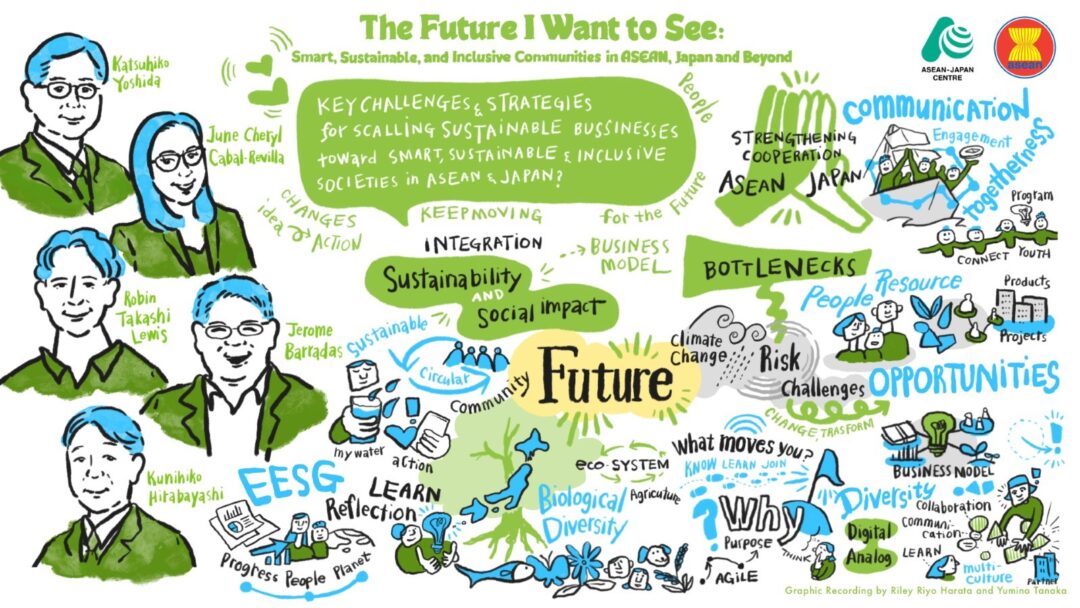
In conclusion, the event highlighted that achieving smart, sustainable, and inclusive communities requires a holistic, end-to-end approach involving economic, environmental, social, and governance aspects. It is a collective responsibility where every sector and individual have a crucial part to play.
The panel discussion was succeeded by a showing of the 10 winning films of the ASEAN Short Film Award, a short film contest organized by the ASEAN-Japan Centre in FY2024.
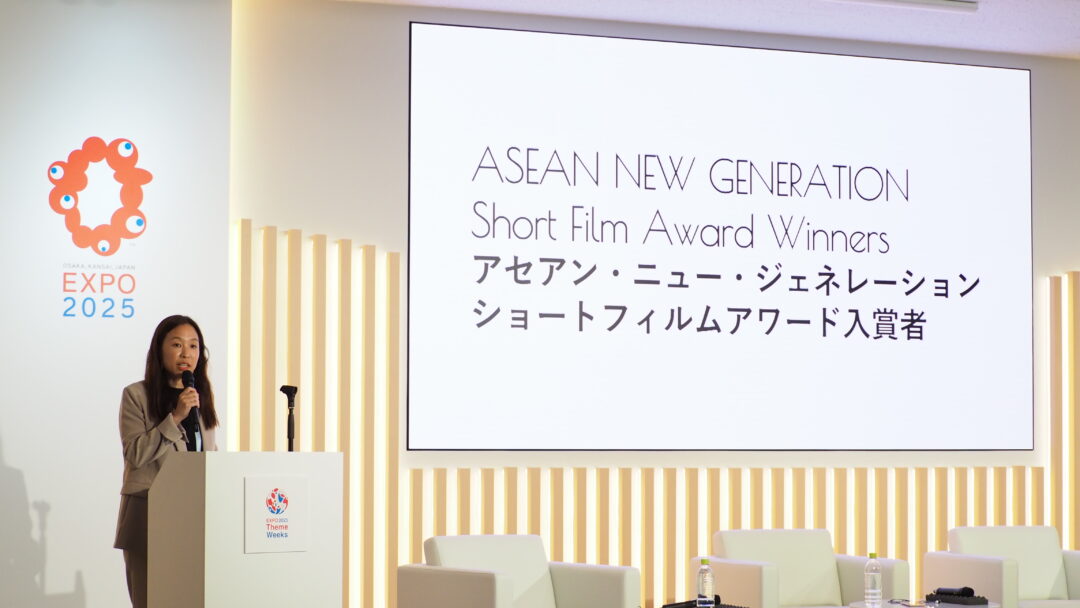
List of films in order of screenings:
- KANTO (Director: Alfonso) (Philippines)
- Distance (Director: Mattiphob Douangmyxay) (Lao PDR)
- Replay (Director: Franky Arrocena) (Philippines)
- Magiging Okay Ang Lahat / Everything’s Gonna Be Okay (Director: Patrick Baleros) (Philippines)
- The Assignment (Director: Yusril Mahendra) (Indonesia)
- Hobby (Director: Lance Christian Gabriel) (Philippines)
- The Outside Life Balance (Director: Somsavath Sygnavong) (Lao PDR)
- The Grilled Rice (Director: Xokananh) (Lao PDR)
- Dear, Bapak… (Director: Adam Zainal) (Malaysia)
- Frames of Tomorrow (Director: KIM VIPUTH) (Cambodia)
YouTube Playlist is available here
Finally, the event was capped with an empathic call to action towards environmental, social and economic sustainability in the region by the ASEAN Secretary General H.E. Dr. Kao Kim Hourn. The audience were asked to write their own aspirations and call-to-action on how they can contribute to sustainability efforts in their own capacities, and these were collected in an interactive artwork shown below. Special thanks to Mr. Riyo Harata and Ms. Yumino Tanaka for creating the visual summary and interactive artwork that encapsulated the highlights of the event.
